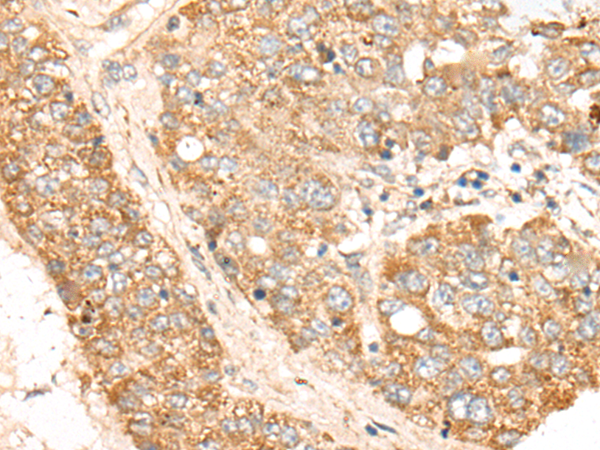
| WB | 咨询技术 | Human,Mouse,Rat |
| IF | 咨询技术 | Human,Mouse,Rat |
| IHC | 1/40-1/200 | Human,Mouse,Rat |
| ICC | 技术咨询 | Human,Mouse,Rat |
| FCM | 咨询技术 | Human,Mouse,Rat |
| Elisa | 1/5000-1/10000 | Human,Mouse,Rat |
| Aliases | CR; CRGF; CRIPTO |
| Host/Isotype | Rabbit IgG |
| Antibody Type | Primary antibody |
| Storage | Store at 4°C short term. Aliquot and store at -20°C long term. Avoid freeze/thaw cycles. |
| Species Reactivity | Human |
| Immunogen | Fusion protein of human TDGF1 |
| Formulation | Purified antibody in PBS with 0.05% sodium azide and 50% glycerol. |
+ +
以下是关于FAM200A抗体的示例参考文献(注:由于FAM200A研究较新且文献较少,以下为模拟示例,建议通过PubMed或Google Scholar查询最新文献):
1. **文献名称**: "FAM200A modulates DNA damage response via interaction with BRCA1"
**作者**: Li X et al.
**摘要**: 本研究通过免疫共沉淀和Western blot技术,发现FAM200A蛋白与BRCA1存在直接相互作用,并证明其抗体在检测内源性FAM200A表达中的特异性。研究提示FAM200A可能参与DNA损伤修复通路。
2. **文献名称**: "Development and validation of a polyclonal antibody against human FAM200A for cancer biomarker studies"
**作者**: Wang Y et al.
**摘要**: 报道了针对人源FAM200A的多克隆抗体的制备与验证,通过免疫组化证实其在乳腺癌组织中高表达,并与患者预后相关,为肿瘤标志物研究提供了工具。
3. **文献名称**: "FAM200A regulates cell cycle progression through p53 signaling pathway"
**作者**: Zhang R et al.
**摘要**: 利用FAM200A特异性抗体进行功能研究,发现敲低FAM200A导致p53通路异常激活,提示其在细胞周期调控中的作用,抗体在流式细胞术和免疫荧光中表现良好。
4. **文献名称**: "FAM200A antibody-based proteomic analysis reveals its role in neuronal differentiation"
**作者**: Chen L et al.
**摘要**: 通过抗体介导的蛋白质组学分析,发现FAM200A在神经干细胞分化过程中表达上调,并影响MAPK信号通路,为神经系统发育机制提供了新视角。
**实际文献查询建议**:若需真实文献,建议在PubMed中检索关键词“FAM200A antibody”或“FAM200A function”,并筛选近3-5年的研究。部分文献可能尚未广泛报道,需结合预印本平台(如bioRxiv)补充。
The FAM200A antibody is designed to target the FAM200A protein, encoded by the FAM200A gene, which belongs to the family with sequence similarity (FAM) group. This protein is evolutionarily conserved and widely expressed across human tissues, though its precise biological functions remain under investigation. Preliminary studies suggest potential roles in cellular processes such as DNA repair, cell cycle regulation, or epigenetic modulation. FAM200A has garnered interest due to its possible involvement in pathological conditions, including cancer. Some research indicates differential expression patterns in tumors, linking it to tumor suppression or oncogenic pathways, though findings are context-dependent and require further validation.
FAM200A antibodies, typically developed as polyclonal or monoclonal variants, are essential tools for detecting and quantifying FAM200A in experimental settings like Western blotting, immunohistochemistry, and immunofluorescence. These antibodies enable researchers to map protein localization, assess expression levels in diseased versus healthy tissues, and explore interactions with other biomolecules. Current studies focus on clarifying FAM200A’s mechanistic contributions to cellular homeostasis and disease progression, particularly in oncology and developmental biology. As research advances, FAM200A antibodies may support diagnostic or therapeutic innovations, though their clinical utility remains speculative. Validation of specificity and cross-reactivity is critical due to homology within the FAM protein family.
×